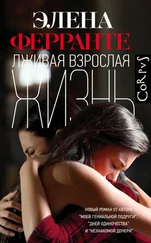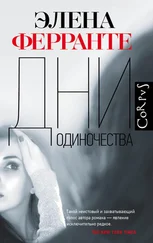2.
In that phase I avoided calling Vittoria, or seeing her. I justified it by thinking: this way it’s easier to say to Angela and Ida that she’s busy and doesn’t have time even to see me. But the reason was different. I felt like crying all the time, and I knew by now that only with my aunt would I be able to weep in complete freedom, screaming, sobbing. Oh yes, I wanted a moment of release, no words, no confidences, only an expulsion of suffering. But who would assure me that, just as I erupted into tears, I wouldn’t fling in her face her responsibility, wouldn’t yell with all the fury I was capable of that, yes, I had done as she told me, I had looked exactly as she had told me to look, and now I knew that I shouldn’t have, I shouldn’t have under any circumstances, because I had discovered that my father’s best friend—in essence a repulsive man—was squeezing my mother’s ankle between his while they were having dinner, and that my mother didn’t jump up indignantly, didn’t cry, how dare you, but let him squeeze it? I was afraid, in other words, that, once I started crying, my decision to remain silent would suddenly collapse, and that I absolutely didn’t want. I knew very well that as soon as I told Vittoria she would pick up the telephone and tell my father everything for the joy of hurting him.
Then what? Gradually I calmed down. I examined yet again what I had really seen, I got rid of the fantasies by force, day by day I tried to drive out the impression that something very serious was about to happen to my family. I felt the need for company, I wanted to distract myself. So I spent even more time with Angela and Ida, and that intensified their demands to meet my aunt. In the end I thought: what will it cost me, what’s the harm? So one afternoon I decided to ask my mother: some Sunday could I bring Angela and Ida to meet Aunt Vittoria?
My obsessions aside, at that time she was objectively overloaded with work. She raced to school, came home, went out again, came home, shut herself in her room to work until late at night. I took it for granted that she would absently say: all right. Instead, she didn’t seem pleased.
“What do Angela and Ida have to do with Aunt Vittoria?”
“They’re my friends, they want to meet her.”
“You know that Aunt Vittoria won’t make a good impression.”
“Why?”
“Because she’s not a presentable woman.”
“What do you mean?”
“That’s enough, I don’t have time now to discuss it. In my opinion you should stop seeing her as well.”
I was angry, I said I wanted to talk about it with my father. My head was bursting, against my will: you aren’t presentable, not Aunt Vittoria; I’ll tell Papa what you do with Mariano and you’ll pay. Then, without waiting for her usual work of mediation, I ran to my father’s study, feeling—I was surprised at myself, frightened, I couldn’t restrain myself—that I was truly capable of dumping on him what I had seen together with what I had intuited. But when I went into the room and almost shouted, as if it were a question of life and death, that I wanted Angela and Ida to meet Vittoria, he looked up from his papers and said affectionately: there’s no need to shout, what’s going on?
I immediately felt relieved. I repressed the information I had on the tip of my tongue, I kissed him hard on one cheek, I told him about Angela and Ida’s request, I complained about my mother’s rigid position. He maintained his conciliatory tone and didn’t rule out the initiative, but he repeated his aversion toward his sister. He said: Vittoria is your problem, your private curiosity, and I don’t want to comment on it, but you’ll see that Angela and Ida won’t like her.
Surprisingly Costanza, who had never in her life met my aunt, manifested the same hostility, as if she had consulted with my mother. Her daughters had to battle for a long time to get permission, they reported to me what she had proposed: invite her here, or meet her, I don’t know, in a café in Piazza Vanvitelli, long enough to satisfy Giovanna and be done. As for Mariano, he was no less against it: what’s the point of spending a Sunday with that woman, and then, good God, to go down there, a terrible place, there’s nothing interesting to see. But in my eyes he didn’t even have the right to breathe, and so I explained to Angela, lying, that my aunt had said we had to go to her, to her house, or nothing doing. In the end, Costanza and Mariano capitulated, but together with my parents they organized everything in detail. Vittoria would pick me up at nine-thirty; then we would go together to get Angela and Ida; finally, coming home, my friends would be dropped off at their house at two and I at my house at two-thirty.
Then I telephoned Vittoria, with trepidation: until that moment I hadn’t even consulted her. She was brusque as usual, she scolded me because she hadn’t heard from me for a long time, but in essence she seemed glad that I wanted to bring my friends with me. She said: everything that pleases you pleases me, and she accepted the finicky schedule that had been imposed, even if in the tone of someone who’s thinking: sure, why not, I’ll do what I feel like.
3.
So it was that one Sunday, when Christmas decorations were already appearing in the shop windows, Vittoria arrived punctually at my house. I had been waiting for her apprehensively at the front door for a quarter of an hour. She seemed cheerful, she descended to Via Cimarosa in the Fiat 500 at high speed, singing and making me sing, too. We found Costanza waiting with her daughters, all three pretty and tidy, as if in a television ad. When I suddenly realized that my aunt hadn’t even brought the car to the curb and already, a cigarette between her lips, was registering Costanza’s extreme elegance with a mocking look, I said anxiously:
“Don’t get out, I’ll let my friends in and we’ll go.”
But she didn’t even hear me, she laughed, she muttered in dialect:
“Did she sleep like that or is she going to an early-morning reception?”
Then she got out of the car and greeted Costanza with a cordiality so exaggerated that it seemed clearly fake. I tried to get out, but the door was defective, and while I was struggling with it I observed in great agitation Costanza smiling politely, with Angela on one side and Ida on the other, while Vittoria was saying something, cutting the air with broad gestures. I hoped she wasn’t using curse words, and meanwhile I managed to open the door. I rushed out in time to hear my aunt, half in Italian, half in dialect, complimenting my friends:
“Pretty, pretty, pretty. Like their mother.”
“Thank you,” said Costanza.
“And these earrings?”
She began to praise Costanza’s earrings—she touched them with her finger—then moved on to her necklace, her dress, she touched everything for a few seconds, as if she were standing before a decorated mannequin. I was afraid, at one point, that she would pull up the hem of Costanza’s dress to examine her stockings more closely, to look at her underpants, she would have been capable of it. But suddenly she calmed down, as if an invisible noose had tightened around her throat to remind her to compose herself, and she paused with a serious expression on the bracelet Costanza had on her wrist, a bracelet I knew well, it was the one that Angela and Ida’s mother especially liked. It was of white gold, with a flower whose petals were diamonds and rubies, splendid precisely in the sense that it gave off light; even my mother envied it.
“It’s really beautiful,” Vittoria said, holding Costanza’s hand and touching the bracelet with her fingertips with what seemed to me sincere admiration.
“Yes, I like it, too.”
“You’re very attached to it?”
Читать дальше
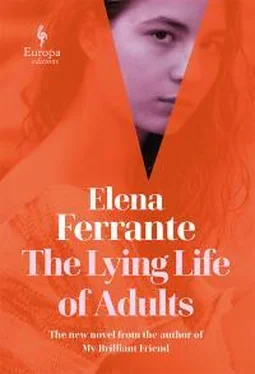
![Элена Ферранте - История о пропавшем ребенке [litres]](/books/32091/elena-ferrante-istoriya-o-propavshem-rebenke-litres-thumb.webp)
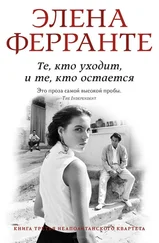
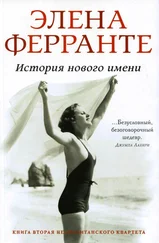
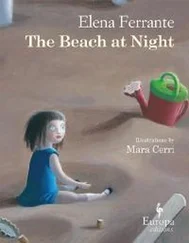
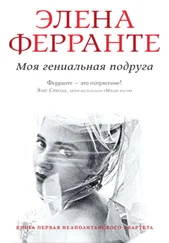
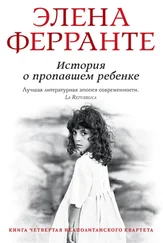
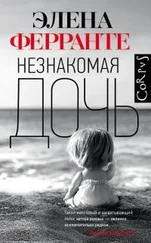
![Элена Ферранте - Дни одиночества [litres]](/books/404671/elena-ferrante-dni-odinochestva-litres-thumb.webp)

